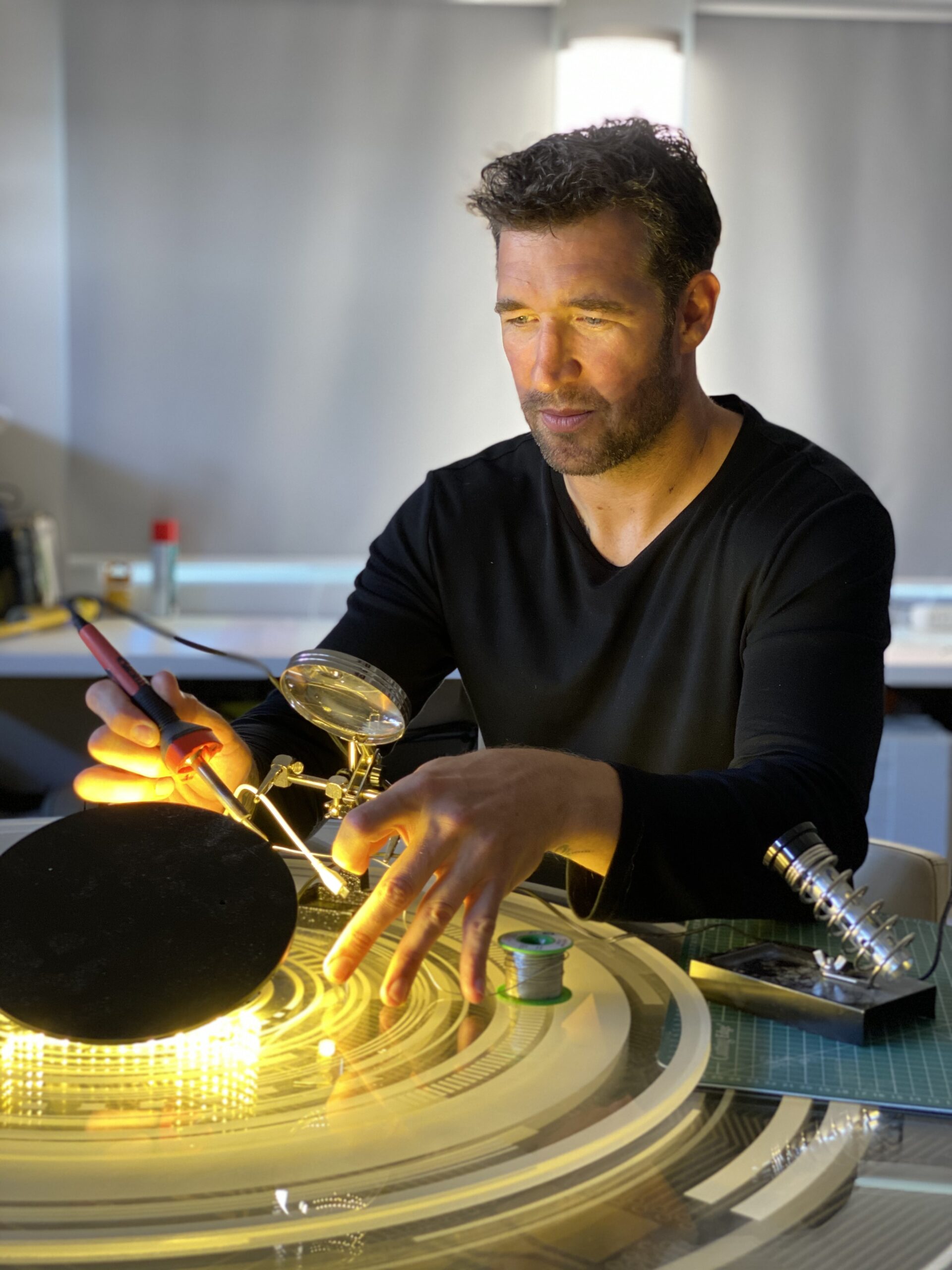From the historic cobbled streets of Colchester, England, to the forefront of contemporary design, Ben Rousseau emerges as a luminary in light art and design. His journey, marked by a restless creativity and a drive to redefine our visual and temporal landscapes, has led him to become a pivotal figure in modern art and timekeeping. Rousseau’s work, blending futuristic aesthetics with practical innovation, brings a new layer of delight to people’s lives and spaces.
Growing up in England’s oldest recorded town, surrounded by the palpable weight of history, Rousseau always aimed to push beyond the traditional, driven by a desire to shape the future. Labelled as a disruptor and a dreamer, and only recently diagnosed with ADHD, Rousseau struggled in traditional educational settings. However, his perceived disadvantages fueled his determination to prove doubters wrong and escape the small-town mentality that confined him.
Rousseau’s passion for the futuristic allure of James Bond and the storytelling depth of Blade Runner influenced his career profoundly, steering him towards the creation of light-based art and design. This passion has been a guiding force in his life, leading him to a unique niche where he merges the emotion of cinematic sci-fi with the tactile beauty of design. His work doesn’t just brighten spaces; it transforms them into experiences that evoke joy and wonder.
His career highlights are as varied as they are impressive. From winning a gold medal at the Chelsea Flower Show for an experiential garden designed for the Royal National Institute of the Blind to creating installations at the Victoria and Albert Museum during the London Design Festival, Rousseau’s projects consistently push the boundaries of conventional design. One of his most striking endeavors was the creation of an infinity light tunnel that simulated a never-ending void, a feature designed to work under the challenging conditions of direct sunlight.
Further afield, Rousseau represented England at the World Fire Sculpture Competition in Riga, Latvia, and undertook numerous projects in the Arctic wilderness of Sweden’s Yukasjarvi Ice Hotel, including designing a spectacular catwalk for Chanel in Paris. His work for the 2012 Olympics, designing a headline vehicle for Samsung used by VIPs like David Beckham, highlights his versatility and ability to blend creative vision with iconic cultural moments.
The creation of his Tempus light clocks marks a significant chapter in Rousseau’s career. These clocks are not just time-telling devices; they are an artistic exploration of how we experience and value time. The collection has garnered multiple awards and encapsulates his philosophy of design and creativity. It is this innovative approach to time design that has recently earned him a place in the Alliance of British Watch and Clock Makers, marking his entry into the serious world of watch and clock production.
Rousseau’s journey has not been without challenges. Initially, after launching his studio at 24 without a clear business plan, he enjoyed the freedom to create but struggled to define a strategic direction for his work. His relentless pace and lack of time management nearly led to burnout, a situation that prompted a move to California, providing him the space to refocus and prioritize family and personal well-being.
His advice to aspiring creatives is to plan meticulously and seek mentorship. The business aspect of creativity, he believes, is as crucial as the artistic process itself. Rousseau emphasizes the importance of understanding the value of time—not just in his designs but in life and business management.
Looking ahead, Rousseau envisions a future where his work redefines how we perceive and experience time. He dreams of integrating his timepieces into iconic locations like Times Square or creating a modern version of Big Ben. His ultimate goal is to develop a collection entirely made from recycled materials, reflecting his commitment to sustainability and environmental responsibility.
Ben Rousseau’s work is a testament to the power of art to transform spaces and minds. Through his innovative use of light and his visionary approach to design, he not only challenges our perceptions of time and space but also offers us a glimpse into the future of design—a future where every moment is illuminated with beauty and innovation.











































